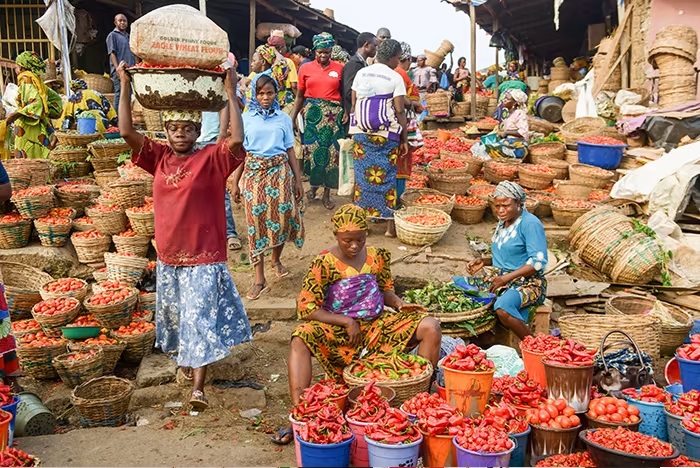
Nigeria has received its first shipment of imported brown rice in a decade from Thailand as part of efforts to address skyrocketing food prices that have strained consumers, stoking sky-high inflation.
This shipment, facilitated by logistics company DUCAT, has reignited debates about the country’s food insecurity, the limitations of its agricultural sector, and the consequences of past government policies.
DUCAT Chief Executive Officer Adrian Beciri highlighted the shipment as part of efforts to address Nigeria’s soaring food prices and improve accessibility.
Register for Tekedia Mini-MBA edition 19 (Feb 9 – May 2, 2026): big discounts for early bird.
Tekedia AI in Business Masterclass opens registrations.
Join Tekedia Capital Syndicate and co-invest in great global startups.
Register for Tekedia AI Lab: From Technical Design to Deployment (next edition begins Jan 24 2026).
“Nigeria has been working hard to find solutions to broaden and strengthen its food supply accessibility,” Beciri stated.
The importation follows the government’s tariff moratorium on essential food crops like rice, wheat, and corn.
Nigeria’s hunger crisis was compounded by a wave of economic reforms introduced by President Bola Tinubu’s administration in May 2023. Key measures, including the removal of fuel subsidies, naira devaluation, and electricity tariff hikes, have triggered a surge in inflation. Food inflation, in particular, rose to 41% in May 2024, the highest in 28 years, with prices continuing to climb as the naira’s value plummets.
To address these challenges, the Tinubu administration announced a 180-day duty waiver on the importation of essential food crops. Minister of Agriculture and Food Security Abubakar Kyari revealed plans to introduce guidelines ensuring compliance with the measures and subject imported foods to recommended retail prices.
However, the government’s decision to resort to food imports underscores the agricultural sector’s inability to meet the nation’s food demands.
Nigeria consumes approximately seven million tons of rice annually, but local production accounts for only three million tons, leaving a significant shortfall. The importation of rice is thus seen as a necessary stopgap to address immediate shortages while highlighting deeper systemic issues in the agricultural sector.
The Consequences of Border Closures
The current hunger crisis and broader economic challenges have been traced back to the border closure policy implemented under former President Muhammadu Buhari in 2019. The policy, aimed at curbing smuggling and boosting local production, had unintended consequences, including disrupting legitimate trade and limiting access to essential food items.
Economists and policymakers have argued that the border closure exacerbated food insecurity rather than alleviating it. Senator Francis Fadaunsi, Chairman of the Senate Committee on Industry, recently criticized the policy during a Senate session.
“Border closure is hampering the economic fortunes of the country because rather than curb smuggling, it encourages it,” he said.
Fadaunsi further explained the policy’s impact on rice production and trade.
“For example, on rice production alone, the largest percentage of the four million tons shortfall is being smuggled into the country since local producers are only producing three million tons out of the expected consumption rate of seven million tons,” he stated.
The senator also noted that the closure of Nigeria’s borders with neighboring countries like Niger and Chad has worsened insecurity in border regions and deepened the nation’s economic woes.
He added that the exit of Niger Republic and Chad from the Economic Community of West African States (ECOWAS) with the attendant opening of their borders on the Nigerian side has compounded these challenges.
Despite the growing evidence of the border closure’s detrimental effects, Bola Tinubu’s administration has resisted calls to fully reverse the policy. Senator Fadaunsi and other lawmakers have repeatedly urged the government to reconsider, arguing that reopening borders would facilitate legitimate trade, reduce smuggling, and alleviate food shortages.
He said the borders should be fully opened and not technically closed.
The failure to heed these calls has left Nigeria reliant on emergency measures like food importation, which provide temporary relief but do little to address the structural issues at the heart of the crisis.
While food imports may temporarily ease shortages, experts warn that they are not a sustainable solution. Instead, the government must address the root causes of food insecurity, including inadequate investment in agriculture, poor infrastructure, and restrictive trade policies.



